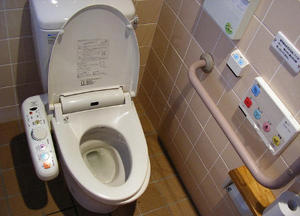Public health"Smart Potty": medical check ups, automatic seat-lowering
Japanese “intelligent” toilets offer users an array of functions — heated seats, water jets with pressure and temperature controls, hot-air bottom dryers, perfume bursts, ambient background music, and noise-masking audio effects for the easily embarrassed; the latest model also offers instant health check-up every time a user answers the call of nature

Smart toilet with seat-side and wall-mounted control panels // Source: bestofremodeling.com
Japan is the global leader in high-tech toilet design, so the latest restroom marvel should be welcomed, even though it should probably come with a health warning for hypochondriacs because it doubles as a medical lab that can really spoil your day.
Japanese toilets have long and famously dominated the world of bathroom hygiene with their array of functions, from posterior shower jets to perfume bursts and noise-masking audio effects for the easily embarrassed.
AFP reports that the latest “intelligent” model, manufactured by market leader Toto, goes a step further and is not for the faint-hearted: it offers its users an instant health check-up every time they answer the call of nature.
Designed for the housing company Daiwa House with Japan’s growing army of elderly in mind, it provides urine analysis, takes the user’s blood pressure and body temperature, and measures their weight with an inbuilt floor scale.
“Our chairman had the idea when he was at a hospital and saw people waiting for health checks. He thought it would be better if they could do the health tests at home,” says Akiho Suzuki, an architect at Daiwa House.
Toto’s engineers developed a receptacle inside the basin to collect the urine for sugar content and temperature checks, and an armband to monitor blood pressure. The readout is displayed on a wall-mounted computer screen.
“With the current model, your data is sent automatically to your personal computer, and then you can email it to your doctor,” said Suzuki. “In the next generation model, the data will be sent automatically to family members or doctors via the Internet,” she told AFP.
The electronic marvel, called the “Intelligence Toilet,” is capable of storing the data of up to five different people and retails for 350,000 to 500,000 yen (about $4,100 to $5,850 dollars) in Japan, she said. “For now our customers are essentially middle-aged and senior people. But we hope the young generation will also become more health-conscious.”
The model is the latest advance in a string of sophisticated toilets, known as “washlets” in Japan, which have become ubiquitous in recent decades. The first models were imported from the United States, where they had been used mainly in hospitals, and quickly became standard in Japan in the booming 1980s, finding their way into at least 70 percent of Japanese homes now.
Pioneering Toto designed its first models by asking hundreds of its employees to test a toilet and mark, using a string
